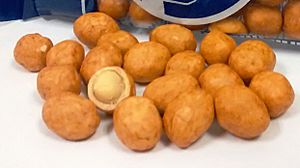Japanese-style peanuts facts for kids
 |
|
| Alternative names | Japanese peanuts Cracker nuts Cacahuate Japonés Cacahuates japoneses Maní Japonés |
|---|---|
| Type | Snack |
| Place of origin | |
| Created by | Yoshigei Nakatani |
| Invented | 1940s |
Japanese-style peanuts, also known as Japanese peanuts or cracker nuts, are a yummy snack food. They are made from peanuts covered in a crunchy wheat flour dough. After being coated, they are fried until crispy. You can find them in many different flavors!
These special peanuts are thought to have started in Mexico. A Japanese immigrant named Yoshigei Nakatani invented them in the 1940s. In Spanish-speaking countries, they are often called cacahuates Japoneses or maní Japonés. The Mexican recipe for the extra-crunchy shell includes wheat flour, soy sauce, water, sugar, and a little citric acid.
Contents
Other Crunchy Peanut Snacks
Many countries have their own versions of coated peanuts. Here are a few examples:
Borrelnootje from the Netherlands
In the 1950s, a Chinese Indonesian person named Frans Go started a company in the Netherlands. His company, Go & Zoon (later called Go-Tan), made peanuts with a crisp, starchy shell. These were known as borrelnootje and sold as Katjang Shanghai.
Koh-Kae from Thailand
The Thai snack company Mae-Ruay began making their own coated peanuts in 1976. Their brand, Koh-Kae, features peanuts fried in a wheat flour batter. This batter is flavored with tasty coconut cream.
Chip Nuts from Canada
Picard Peanuts is a Canadian company that makes a snack called Chip Nuts. These are peanuts covered in a potato chip coating. They come in many different potato chip flavors, making them extra fun to eat.
Krikri from Lebanon
In Lebanon, you can find a very similar product called "krikri." This shows how popular these crunchy peanuts are around the world.
Cracker Nuts from the Philippines
The term "cracker nuts" was first used by a Philippine brand called Nagaraya. They started using this name in 1967 for their own coated peanut snack.
See also
 In Spanish: Cacahuate japonés para niños
In Spanish: Cacahuate japonés para niños

